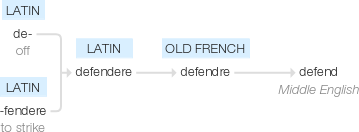Defend
Middle English: from Old French defendre, from Latin defendere, from de- ‘off’ + -fendere ‘to strike’. Compare with offend.
wiktionary
From Middle English defenden, from Old French defendre, deffendre (Modern French défendre), from Latin dēfendō(“to ward off”), ultimately from Proto-Indo-European *gʷʰen-.
etymonline
defend (v.)
mid-13c., defenden, "to shield from attack, guard against assault or injury," from Old French defendre (12c.) "defend, resist," and directly from Latin defendere "ward off, protect, guard, allege in defense," from de "from, away" (see de-) + -fendere "to strike, hit, push," attested only in compounds (such as offendere "to strike against; encounter;" infensus "aggressive, hostile"), from PIE root *gwhend- "to strike, kill" (source also of Hittite kue(n)zi "to kill," Sanskrit ghnanti "to kill; Greek theino "to slay, to kill;" Armenian jnem "to strike;" Lithuanian ginti "to protect, defend;" Old Irish gonaid "wounds, kills;" Welsh gwan "to thrust, hit;" Old Breton goanaff "to punish, sting").
It is attested from c. 1300 as "fight in defense of" (someone or something). From mid-14c. as "defend with words, speak in support of, vindicate, uphold, maintain." In Middle English it also could mean "forbid, prohibit; restrain, prevent." In the Mercian hymns, Latin defendet is glossed by Old English gescildeð. Related: Defended; defending.
